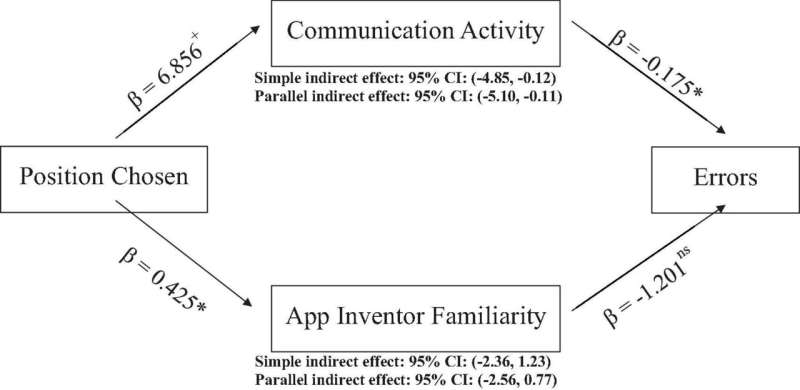This article has been reviewed according to Science X's editorial process and policies. Editors have highlighted the following attributes while ensuring the content's credibility:
fact-checked
peer-reviewed publication
trusted source
proofread
People who communicate more, show expertise are more likely to be seen as essential team members: Study

A new study sheds light on the vital role of communication and expertise within organizations, revealing their impact on group performance. Researchers examined how individuals become part of communication networks and the effect of selection processes on group performance.
The study found that people who communicated more during training were more likely to be chosen as a central member of the network. In addition, teams that chose their central member performed as well as and often better than teams whose central member was randomly assigned.
The study, by researchers at Carnegie Mellon University, the Frankfurt School of Finance and Management, the University of Massachusetts Dartmouth, and Clark University, is published in Frontiers in Psychology.
"The people in network positions and the processes by which they arrive at those positions play a significant role in determining team performance," says Linda Argote, Professor of Organizational Behavior and Theory at Carnegie Mellon's Tepper School of Business, who coauthored the study.
"For centralized network positions which require occupants to transfer information to other members of the network, it is critical to have good communication skills."
Communication networks serve as the conduits for knowledge exchange, and central members in a network are often responsible for gathering and sharing that information. Researchers drew on studies on communication networks as well as the Carnegie research perspective, which studies the ways organizations gain efficiency through learning, developing routines and structures, and exchanging knowledge.
To test whether group members who choose the occupants of network positions select themselves and others that best suit skill requirements of the position, the authors compared the performance of groups whose members received their choice of who occupied which network position to the performance of groups whose members did not.
They conducted a lab study that involved nearly 125 university students. They had two experimental conditions: in one condition, members received their choice of who occupied the central position; in the other condition, members did not receive their choice.
Allowing group members to choose who occupies which network positions enabled teams to optimize their position assignments based on individuals' skills and expertise (e.g., organization, delegation), which boosted groups' performance.
Team members were more likely to choose individuals who communicated frequently and those who appeared to have task-related expertise to occupy the central network position. Teams receiving their choice of central member performed better than teams not receiving their choice or teams in which members were randomly assigned to the position.
Among the study's limitations, the authors note that they investigated the effects of choice as they pertained to network positions in a single network structure, not whether groups performed differently when they could choose their network structures.
"The Carnegie perspective speaks to formal and informal communication structures in organizations but not about the processes through which workers come to occupy network positions," explains Jerry Guo, Assistant Professor of Strategy at the Frankfurt School of Finance and Management, who led the study.
"We extended this perspective by showing that the process through which individuals come to occupy network positions affects the performance of networks. In this way, we contribute to an understanding of how the development of a network, not just its structure, influences performance."
More information: Jerry Guo et al, Communication networks and team performance: selecting members to network positions, Frontiers in Psychology (2023). DOI: 10.3389/fpsyg.2023.1141571
Journal information: Frontiers in Psychology




















